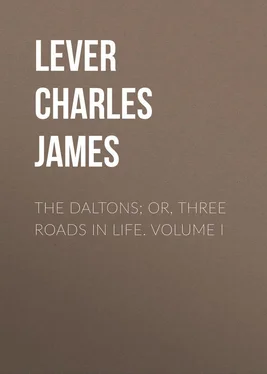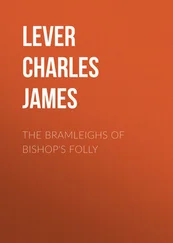Charles Lever - The Daltons; Or, Three Roads In Life. Volume I
Здесь есть возможность читать онлайн «Charles Lever - The Daltons; Or, Three Roads In Life. Volume I» — ознакомительный отрывок электронной книги совершенно бесплатно, а после прочтения отрывка купить полную версию. В некоторых случаях можно слушать аудио, скачать через торрент в формате fb2 и присутствует краткое содержание. Жанр: literature_19, foreign_antique, foreign_prose, на английском языке. Описание произведения, (предисловие) а так же отзывы посетителей доступны на портале библиотеки ЛибКат.
- Название:The Daltons; Or, Three Roads In Life. Volume I
- Автор:
- Жанр:
- Год:неизвестен
- ISBN:нет данных
- Рейтинг книги:4 / 5. Голосов: 1
-
Избранное:Добавить в избранное
- Отзывы:
-
Ваша оценка:
- 80
- 1
- 2
- 3
- 4
- 5
The Daltons; Or, Three Roads In Life. Volume I: краткое содержание, описание и аннотация
Предлагаем к чтению аннотацию, описание, краткое содержание или предисловие (зависит от того, что написал сам автор книги «The Daltons; Or, Three Roads In Life. Volume I»). Если вы не нашли необходимую информацию о книге — напишите в комментариях, мы постараемся отыскать её.
The Daltons; Or, Three Roads In Life. Volume I — читать онлайн ознакомительный отрывок
Ниже представлен текст книги, разбитый по страницам. Система сохранения места последней прочитанной страницы, позволяет с удобством читать онлайн бесплатно книгу «The Daltons; Or, Three Roads In Life. Volume I», без необходимости каждый раз заново искать на чём Вы остановились. Поставьте закладку, и сможете в любой момент перейти на страницу, на которой закончили чтение.
Интервал:
Закладка:
The gallant colonel, who was negligently slapping his boots with his riding-whip below stairs, was not a little amazed at the message. There had been a time when he would have interpreted the favor most flatteringly. He would have whispered to himself, “She has seen me passing the window, she was struck with me as I rode by.” Time had, however, toned down these bright illusions, and he read the permission with a nearer approach to truth, as a fine-lady caprice in a moment of ennui. “I thought as much,” muttered he to himself as he slowly ascended the stairs; “the blockade was too strictly enforced not to tell at last. No newspapers, no books ha! ha! Could n’t help surrendering!”
The colonel had by this time given his whiskers and moustaches the last curl, thrown back his head into a position of calm dignity, as the servant, throwing wide the folding-doors, announced him. Advancing two paces, and bowing low, Colonel Haggerstone said, “Your Ladyship will pardon the liberty the very great liberty I have taken in my respectful inquiries for some days past; but although probably not remembered by Sir Stafford, I once did enjoy the honor of his acquaintance, we met at Lord Kerrison’s, in Scotland.”
Lady Onslow cut short this very uninteresting explanation by a bland but somewhat supercilious smile, that seemed to say, “What possible matter can it be?” while at the same time she motioned him to be seated.
“May I hope that Sir Stafford continues to improve?” said he, bowing again.
“He’s better to-day,” said Lady Onslow, languidly. “Perhaps as well as anyone can be in this wretched place. You heard, I suppose, of the series of misfortunes that befell us, and compelled us to return here?”
The colonel looked mildly compassionate and inquisitive. He anticipated the possible pleasure her Ladyship might feel in a personal narrative, and he was an accomplished listener. This time, however, he was wrong. Lady Onslow either did not think the occasion or the audience worth the trouble of the exertion, and merely said, “We had a break-down somewhere with an odious name. Sir Stafford would travel by that road through the Hohlen Thai, where somebody made his famous march. Who was it?”
“Massena, I think,” said the colonel, at a haphazard, thinking that at least the name was ben trovato, just as Sunday-school children father everything remarkable on John the Baptist.
“Oh dear, no; it was Moreau. We stopped to breakfast at the little inn where he held his headquarters, and in the garden of which he amused himself in pistol-shooting, strange, was it not? Are you a good shot, Colonel?”
“Good among bad ones,” said the colonel, modestly.
“Then we must have a match. I am so fond of it! You have pistols, of course?”
“I am fortunate enough to have a case of Schlessinger’s best, and at your Ladyship’s disposal.”
“Well, that is agreed upon. You ‘ll be kind enough to select a suitable spot in the garden, and if to-morrow be fine By the way what is to-morrow not Sunday I hope?”
The colonel relieved her anxieties by the assurance that the next day would be Monday, consequently that the present one was Sunday.
“How strange! One does make sad confusion in these things abroad,” said she, sighing. “I think we are better in England in that respect, don’t you?”
The question was not a very clear one, but the colonel never hesitated to give in his adhesion.
“Sir Stafford always took that view in the House, and consequently differed from his party, as well as about Ireland. Poor dear Ireland! what is to be done for her?”
This was a rather more embarrassing demand than the previous one, and the colonel hemmed and coughed, and prepared for a speech of subtle generalities; but the dexterity was all unnecessary, for her Ladyship had already forgotten the theme, and everything about it, as she went on. “How I pity those dear Wreckingtons, who are condemned to live there! The Earl, you know, had promised solemnly that he would go any lengths for the party when he got his blue riband; and so they took him at his word, and actually named him to the viceroyalty. It was a very cruel thing, but I hear nothing could be better than his conduct on hearing it: and dear Lady Wreckington insisted upon accompanying him. It was exactly like the story of what was that man’s name, who assisted in the murder of the Emperor Paul Geroboffskoi, or something like that, and whose wife followed him to the mines.”
The colonel avowed that the cases were precisely alike, and now the conversation if the word can be degraded to mean that bald disjointed chat ran upon London people and events their marriages, their dinners, their separations, coalitions, divorces, and departures; on all which themes Haggerstone affected a considerable degree of knowledge, although, to any one less occupied with herself than her Ladyship, it would have been at once apparent that all his information was derived from the newspapers. It was at the close of a lamentation on the utter stupidity of everything and everywhere, that he adroitly asked where she meant to pass the winter.
“I wish I knew,” said she, languidly. “The Dollingtons say Naples; the Upsleys tell us Rome; and, for my part, I pronounce for neither. Lady Dollingtou is my aversion, and the three Upsley girls, with their pink noses and red hair, are insufferable.”
“What does your Ladyship think of Florence?” asked the colonel, soothingly.
“Pretty much what I might of one of the Tonga Islands. I know nothing of the place, the people, or the climate. Pray tell me about it.”
“There is very little to say,” said Haggerstone, shrugging his shoulders; “not but the place might be very agreeable, if there were some one of really fashionable standing to take the lead and give a tone to the society; some one who would unite indispensable rank and wealth with personal graces, and thus, as it were, by prescriptive right, assume the first place. Then, I say, Florence would be second to no city of Italy. Would that your Ladyship would condescend to accept the vacant throne!”
“I!” said she, affecting astonishment; and then laughingly added: “Oh no! I detest mock sovereignty. I actually shudder at the idea of the lady-patroness part; besides, whom should one have to reign over? Not the Browns and Smiths and Perkinses; not the full-pensioned East Indians, the half-pay colonels, and the no-pay Irish gentilities, that form the staple of small city society. You surely would not recommend me to such a sad pre-eminence.”
The colonel smiled flatteringly at her Ladyship’s smartness, and hastened to assure her that such heresy was far from his thoughts; and then with a practised readiness ran over a list of foreign celebrities French, Russian, and German whose names, at least, clinked like the true metal.
This looked promisingly; it was very like cutting all English society, and had the appearance of something very exclusive, very impertinent, and very ungenerous; and now she lent a willing ear as Haggerstone revealed a plan of operations for a whole winter campaign. According to his account, it was a perfect terra incognita, where the territorial limits and laws might be laid down at will; it was a state which called for a great dictatorship, and the sway of unlimited authority.
Now, Lady Hester had never at least since her marriage, and very rarely even before it been more than on the periphery of fashionable society. When she did obtain a footing within the charmed circle, it was by no prescriptive right, but rather on some ground of patronage, or some accidental political crisis, which made Sir Stafford’s influence a matter of moment. There was, therefore, a flattery in the thought of thus becoming a leader in society; and she shrewdly remembered, that though there might be little real power, there would be all the tyranny of a larger sovereignty.
Читать дальшеИнтервал:
Закладка:
Похожие книги на «The Daltons; Or, Three Roads In Life. Volume I»
Представляем Вашему вниманию похожие книги на «The Daltons; Or, Three Roads In Life. Volume I» списком для выбора. Мы отобрали схожую по названию и смыслу литературу в надежде предоставить читателям больше вариантов отыскать новые, интересные, ещё непрочитанные произведения.
Обсуждение, отзывы о книге «The Daltons; Or, Three Roads In Life. Volume I» и просто собственные мнения читателей. Оставьте ваши комментарии, напишите, что Вы думаете о произведении, его смысле или главных героях. Укажите что конкретно понравилось, а что нет, и почему Вы так считаете.












